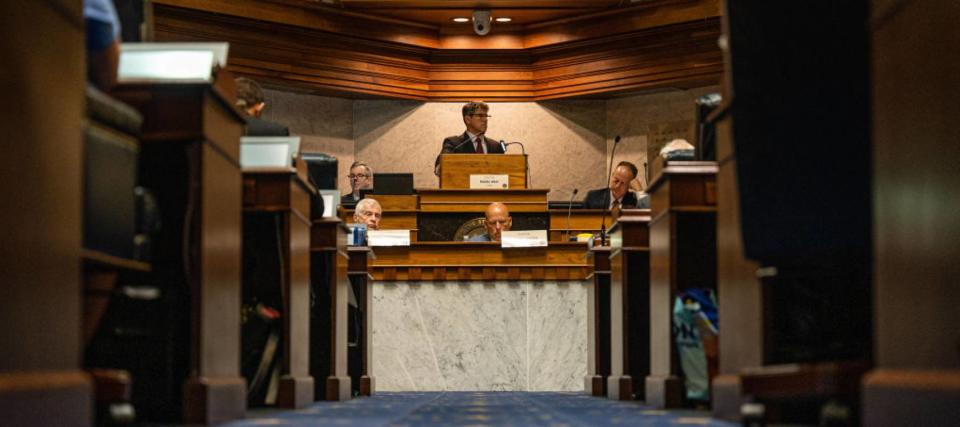Citing homeland security, Indiana set to ban ‘foreign adversaries’ from buying land and hosting sister cities

Indiana lawmakers are pushing new legislation that aims to limit economic and cultural exchange between the state and several countries, including China, that have been deemed "foreign adversaries."
House Bill 1183, sponsored by Sen. Jean Leising (R-Oldenburg), would ban entities associated with China, Cuba, Iran, North Korea, Russia and Venezuela from buying or leasing farmland and land around military bases in the Hoosier State.
Don't miss
Commercial real estate has beaten the stock market for 25 years — but only the super rich could buy in. Here's how even ordinary investors can become the landlord of Walmart, Whole Foods or Kroger
Cost-of-living in America is still out of control — use these 3 'real assets' to protect your wealth today, no matter what the US Fed does or says
These 5 magic money moves will boost you up America's net worth ladder in 2024 — and you can complete each step within minutes. Here's how
“This legislation would work to address a homeland security risk our state — and by default our country — is facing because there are currently companies from adversarial states seeking projects in Indiana, including 11 from China,” Leising said in a press release.
The bill passed the state house in early March and is now with Gov. Eric Holcomb. It coincided with the passage and signing of another recent measure, which blocks those in the state from establishing "sister city" co-operative arrangements with communities in the six countries.
The measure, which was a small part of a larger bill dealing with property taxes, reportedly does not affect Indiana’s sister-state agreement with Chinese province Zhejiang.
Indiana’s not the first state to introduce legislation curbing exchange with Chinese nationals, but experts worry these bans will only help fuel discrimination and xenophobia.
China owns less than 1% of US farmland
As of the end of 2021, Chinese investors owned 383,935 acres of American soil, according to a report on foreign-held land from the U.S. Department of Agriculture (USDA).
Now, while Chinese holdings account for just 0.9% of total foreign-owned U.S. land and far less than what other countries like Canada and the U.K. own, lawmakers have concerns that China could potentially gain control over the U.S. food and energy supply.
NPR Illinois says USDA data shows over 80% of Chinese-owned land is held by major meatpacker Smithfield Foods, and a billionaire named Sun Guangxin who purchased 100,000 acres in Texas for a wind farm (which was later halted by a state law) through his two companies Brazos Highland Properties and Harvest Texas.
Some also fear these acquisitions could be too close to military installations. Craig Singleton, China program deputy director and senior fellow at the Foundation for Defense of Democracies told NPR Illinois there are concerns Chinese telecommunications equipment could be used to disrupt U.S. military communications.
He says it might be better to pause Chinese purchases now “rather than wait years before we determine that this equipment or these purchases are being used for other purposes.”
Read more: Generating 'passive income' through real estate is the biggest myth in investing — here’s how you can do it in as little as 5 minutes
Critics say the bill could promote discrimination
The American Civil Liberties Union (ACLU) of Indiana says the farmland bill will punish immigrants from the prohibited countries who have lived legally in the U.S. for decades since then.
“You are telling them they are no longer welcome here, except as an employee of someone else,” ACLU executive director Chris Daley told WTHR.
Singleton also told NPR Illinois that blanket bans "run the risk of feeding into broader anti-Asian sentiment and xenophobia."
If the legislation goes into effect, Indiana would join several other states, including Florida, Virginia and North Dakota, that have passed laws restricting the ability of Chinese nationals to buy property.
Winnie Tang, an American citizen who moved from China 45 years ago and lives in Miami, told The Washington Post these laws remind her of the Chinese Exclusion Act of 1882 — a decade-long ban on Chinese laborers immigrating to the U.S..
“My face is Chinese,” Tang said. “So that means in the future, if I want to buy any property they could use this law to force me to show ID to prove I’m a citizen and not related to the Chinese government … This law gives people the right to discriminate against me openly.”
What to read next
Rich young Americans have lost confidence in the stock market — and are betting on these 3 assets instead. Get in now for strong long-term tailwinds
Car insurance rates have spiked in the US to a stunning $2,150/year — but you can be smarter than that. Here's how you can save yourself as much as $820 annually in minutes (it's 100% free)
Thanks to Jeff Bezos, you can now use $100 to cash in on prime real estate — without the headache of being a landlord. Here's how
This article provides information only and should not be construed as advice. It is provided without warranty of any kind.
